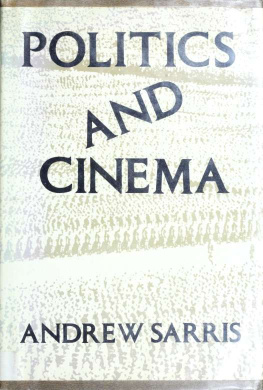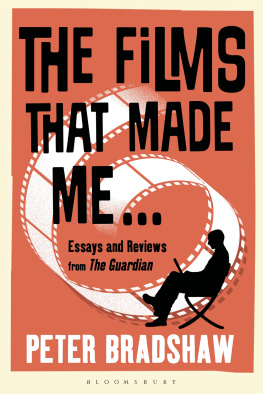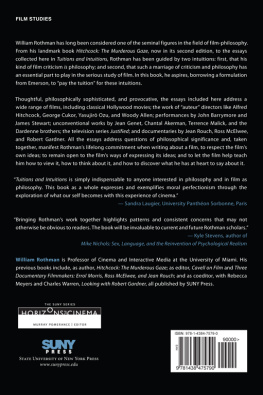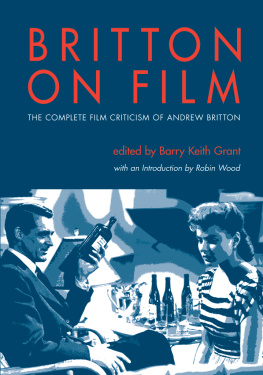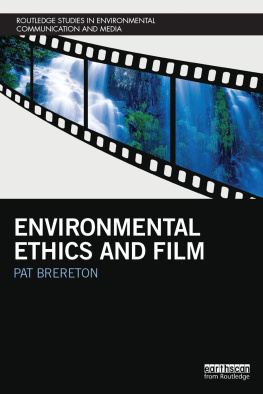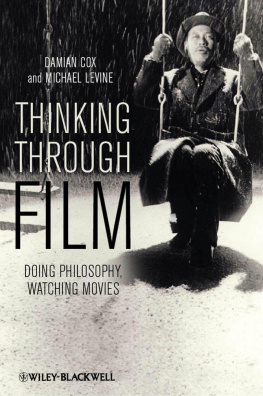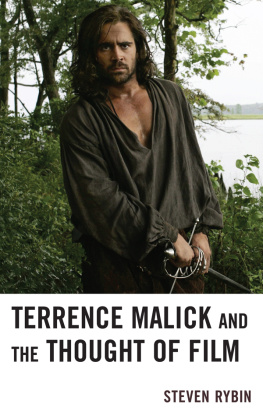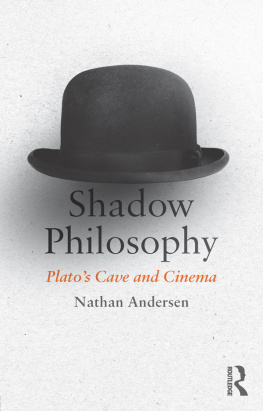First published 2003 by Westview Press
Published 2018 by Routledge
711 Third Avenue, New York, NY 10017, USA
2 Park Square, Milton Park, Abingdon, Oxon OX14 4RN
Routledge is an imprint of the Taylor & Francis Group, an informa business
Copyright 2003 Taylor & Francis
All rights reserved. No part of this book may be reprinted or reproduced or utilised in any form or by any electronic, mechanical, or other means, now known or hereafter invented, including photocopying and recording, or in any information storage or retrieval system, without permission in writing from the publishers.
Notice:
Product or corporate names may be trademarks or registered trademarks, and are used only for identification and explanation without intent to infringe.
Library of Congress Cataloging-in-Publication Data
Light, Andrew, 1966
Reel arguments: film, philosophy, and social criticism / Andrew Light.
p. cm.-- (Thinking through cinema)
Includes bibliographical reference and index.
ISBN-10 0-8133-6573-2 (pbk.: alk. paper); 0-8133-6486-4 (hc)
ISBN-13 978-0-8133-6573-2 (pbk.: alk. paper); 978-0-8133-6486-2 (hc)
1. Motion pictures--Social aspects. 2. Motion pictures--Moral and ethical aspects. I. Title. II. Series.
PN1995.9.S6 L54 2002
302.23"43--dc21
2002015343
ISBN 13: 978-0-8133-6573-2 (pbk)
I am very grateful to numerous friends and colleagues who have provided critical comments on earlier versions of these chapters, in particular, Amelia Amon, Yoko Arisaka, Davis Baird, Murray Baumgarten, Michael Bennett, Albert Borgmann, Allen Carlson, Melissa Clarke, Avner de-Shalit, Ed Dimendberg, Andrew Feenberg, Larry Hickman, Doug Kellner, Michael Kohler, Bill Lawson, Bernd Magnus, Jonathan Maskit, Patrick Maynard, Carl Mitcham, Carole Pateman, Joe Pitt, David Rothenberg, Jim Sheppard, Jonathan Smith, Lisa Stefanoff, Bob Stone and David Strauss, Julia Voss, Bob Stone and Camille Watts. I would also like to thank my Spring 1999 film and philosophy students at SUNY Binghamton, several anonymous readers who originally refereed some of these chapters as journal articles, and those who reviewed the proposal for this collection. Katherine Streckfus, my copy editor, provided many suggestions that improved the manuscript.
Several audiences heard earlier versions of these chapters, and I learned much from every response to those presentations. I am particularly indebted to Michael O'Rourke, Daniel Bukvich, Rick Fehrenbacher, and other faculty participating in the May 2000 McCall, Idaho, workshop on humanities and technology sponsored by the University of Idaho's Humanities Fellows Program, and the subsequent "Tools Symposium," held a year later at the University of Idaho in Moscow. The invitation to work with this group was invaluable in helping me to rethink many of the core concepts in the first part of the book.
At NYU I have the good fortune to be housed in a school and a department that is supportive of departures from my normal topics in applied philosophy. My thanks to all of my colleagues in the Department of Humanities and Social Sciences in the Professions in the Steinhardt School of Education, and others in the Department of Culture and Communication and in the Department of Philosophy, for encouraging me as I was preparing this manuscript, especially Rene Arcilla, Richard Arum, Joy Boyum, Tom Hilde, Tom James, Helen Nissenbaum, John Richardson, Bill Ruddick, Charles Sprague, Jon Zimmerman, and in particular dear friends Jonathan Burston, Sue Murray, and Aurora Wallace, who in very different ways somehow got me through the final stretch.
Finally, I especially wish to thank Nel Carroll for providing guiding inspiration in this field and for personally encouraging me to continue with this work; my editor at Westview Press, Sarah Warner, for her excellent advice on every part of the manuscript, and especially for her supererogatory patience; and Dorit Naaman and Tom Wartenberg, who, more than anyone else, sharpened my take on these topics, prodded me to continue, served as role models as keen film critics themselves, and offered warm and friendly advice. Though these two colleagues and friends are certainly not responsible for the many flaws that may remain in this book, it would not exist without either of them.
I have dedicated this book to the Barbash-Katz family, Eric, Susan, Emma, Ani, and Jonah. My own parents, grandmother, brother, and sister have never failed in their unwavering support for me, no matter what strange pathways and far-flung roads I have taken. I am twice as fortunate though as those with one loving family to have a second as well, composed of these dearest friends, along with their parents and extended families, who have been there for me during some of the most important moments of my adult life. I am not always certain what I bring to their lives, but to me they make humanity more admirable, and the world more beautiful.
A few of these chapters have been adapted from previously published material, though substantially revised and expanded so that the most work in this book appears here for the first time. Nonetheless, the following chapters originated in earlier papers: , which includes material from both "Media, Identity, and Politics: A Critique of Kellner," Research in Philosophy and Technology 17 (1998), pp. 187-200, and "What Is an Ecological Identity?" Environmental Politics 9, no. 4 (2000), pp. 59-81, Andrew Light, New York City, August 2002.
Introduction: Film as Social Philosophy
As is true of many philosophers, my relationship with my discipline has often taken the form of a love affair, and as with many such relationships, it hasn't always been a good one.
For me, the first true heartbreak occurred during my second year in graduate school when I was struggling through a paper on Kant's Critique of Pure Reason. I'll never forget the feeling I had, sweating out a Riverside, California, springtime in a friend's unair-conditioned bungalow, trying to make sense of Kant's often impenetrable text. More than once I thought that the best way to get through this assignment would have just been to quit school. As my mind wandered to other career paths I hit upon the next moveI'd become a filmmaker! Perhaps it was the heat, but I knew that if anything could tempt me away from philosophy, it had to be film. Although certainly not the most practical career path, film had always been the most moving of art forms for me, and a romantic dream of becoming an artist of some kind often tempts a young mind despite limited artistic talents. Besides, I thought, if I wanted to go to film school, I wouldn't have to move too far away.


